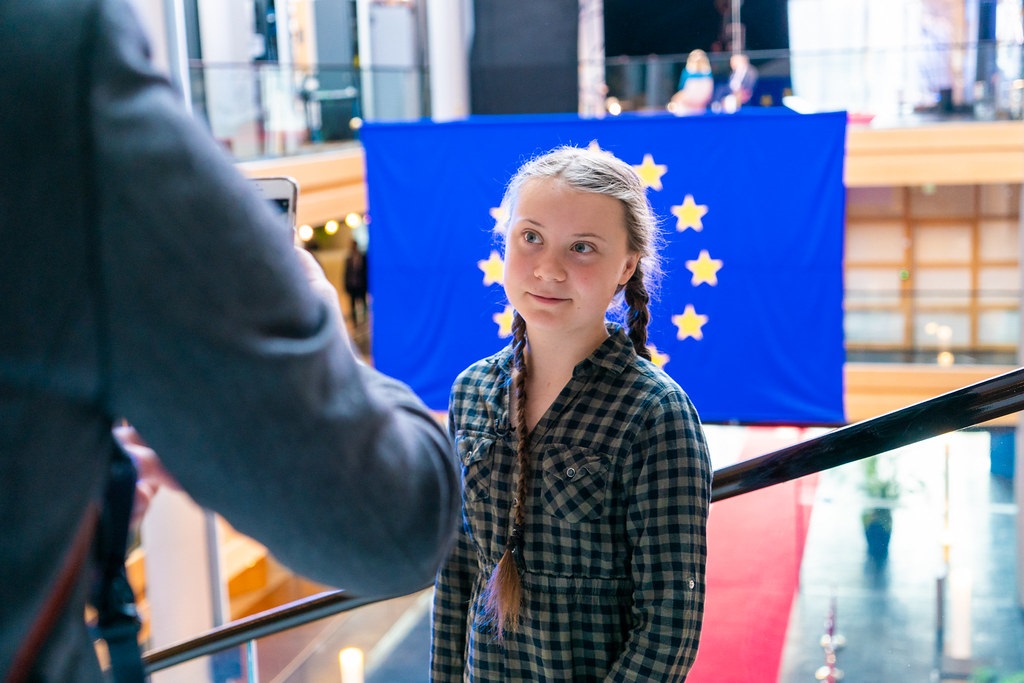Greta Thunberg poses at the EP Plenary Session in France, April 2019. The members of Parliament are currently discussing the means of a European Green Deal. (Photo used by permission of European Parliament)
Climate change is becoming an increasingly alarming issue and is often at the top of the list for political debates. Despite the severity of the issue, governments aren’t doing much to combat climate change. This lack of action is putting future generations at risk, and Greta Thunberg is here to change that.
At just 16 years old, people worldwide know Thunberg for her climate activism. She began her journey in 2018 when she decided to skip school to protest outside the Swedish Parliament with a single sign. As the days went on, other people joined her — now her movement has spread throughout youth all over the world.
She became aware of the issue back in primary-school when Thunberg’s teacher showed the class a video about climate change and its effects. Somehow, by the end of the day, Thunberg still felt the lingering weight of what was to happen in the future. That weight manifested into depression, resulting in malnutrition and numerous hospitalizations. She was just 11 years old when this happened.
To help their daughter recover, Thunberg’s parents, Malena Ernman and Svante Thunberg, started to lower their impact on climate change. The family uses solar panels, has a garden for fresh vegetables, and limit air travel to reduce carbon emissions. Slowly, Thunberg started to become her normal self again.
Her weekly protests are now coined “Friday for Future,” and people show up in the hundreds every Friday hoping governments will hear their voices. Thunberg has spoken in the streets, in front of national leaders, and at the U.N. Climate Action Summit. Her speeches are blunt and to the point, often accusing governments of failing future generations. The world is waking up to her message but of course, she is often met with criticism.
World leaders have had mixed reactions to Thunberg’s activism, some positive, some negative. Brazillian president Jair Bolsonaro called Thunberg a “brat” after she defended indigenous people trying to stop deforestation in the Amazon rainforest. President Donald Trump of the U.S also remarked on Twitter that Thunberg is “a very happy young girl looking forward to a bright and wonderful future…” and needs to work on her anger management. Thunberg’s quick to respond with changing her Twitter bio to “A teenager working on her anger management problem.”
Followers of Thunberg might not know that doctors have diagnosed her with Asperger’s, which is widely known to create a barrier between social interaction and emotion. This is the reason why Thunberg is so direct with her speeches and also why she reacted so strongly when she first discovered the effects of climate change. Asperger’s is generally seen at the mild end of the autism spectrum — but Thunberg doesn’t let this hold her back. She calls her diagnosis a “superpower” and reminds everyone that haters will say Asperger’s limits her.
Despite what negative comments and political accusations she gets, Thunberg provides a rallying cry to what teens all over the world are feeling. She doesn’t want politicians’ empty words, she wants change. And for this reason, TIME magazine deemed the teen worthy of their annual TIME 2019 Person of the Year award.

Hi! My name is Emma and I am a staff writer for The Mycenaean. I am part of the LRHS Chamber Orchestra and I am also scuba certified!

Leave a Reply